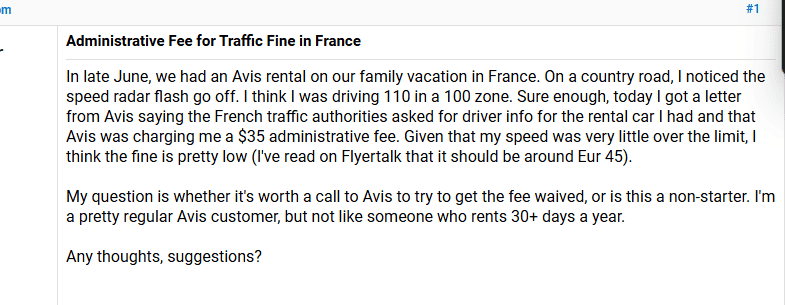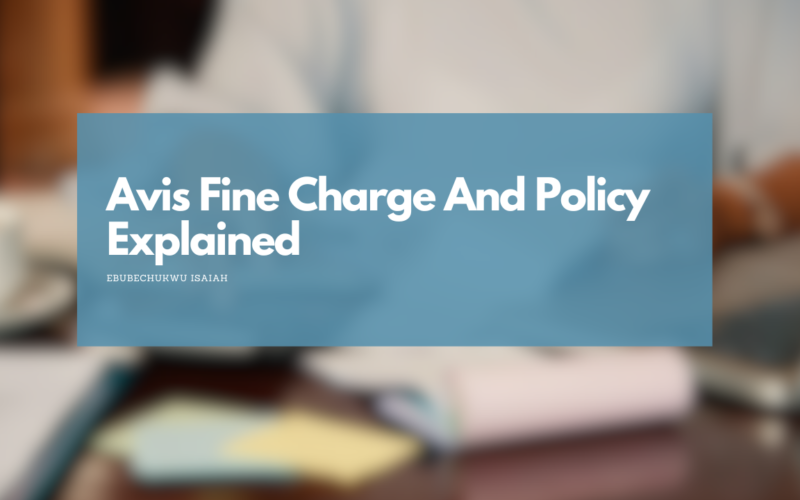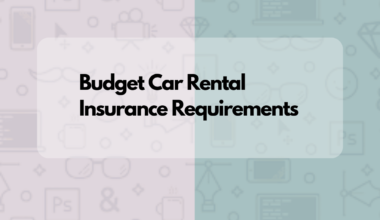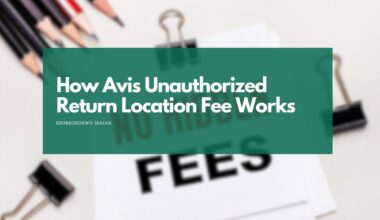As an Amazon Associate, I earn a small commission from qualifying purchases. Learn more about this.
Think about the last time you rented a car. Were you clear about all the fees? Today, we’re looking at Avis and their policy on fines and extra charges.
If you’re planning to rent a car from Avis, this is for you. We’ll break down their rules in a simple way.
A Glance at Some Fines on Avis
| Type of Charge | Description | Typical Cost Range |
|---|---|---|
| Cleaning Violation | Charges for returning a car with excessive dirt or damage | $30 – $400 |
| Damage Charges | Costs for damages to the car not considered fair wear and tear | Varies based on damage extent |
| Late Return | Additional charges for returning the car past the agreed time | Hourly rate after a 29-minute grace period, then daily rate |
| Administration Fees | Fees for handling violations or services | Varies, additional to the cost of the violation or service |
| One-Way Service | Charge for returning the car to a different location | Varies |
| Additional Driver | Fee for adding an extra driver to the rental agreement | Varies |
| Under 25 Fee | Additional charge for drivers under 25 years old | Varies |
| Gas Fee | Charges for not refueling the car before return | Above local fuel rates |
| Concession Recovery Fee | Fee for rentals at airports or hotels | Around $10, can vary |
| Energy Surcharge Fee | Fee to cover electricity consumption at rental location | Applied to all contracts |
| Toll Violations | Charges for unpaid tolls during the rental period | Cost of toll + admin fee |
| Parking Violations | Fees for parking tickets incurred during rental | Cost of ticket + admin fee |
| Speeding Fines | Charges for any speeding violations | Cost of fine + admin fee |
What Are Avis’ Fine Charges?
When you rent a car from Avis, you agree to follow certain rules. One of these is taking care of any fines you might get while driving their car.
Fines can happen for several reasons, like speeding, parking in a wrong spot, or not paying tolls on certain roads.
So, what exactly does Avis do about these fines?
First, if you get a ticket for any reason – say, for parking where you shouldn’t – the local authorities will notify Avis since the car is registered in their name.
When Avis gets this notice, they will identify you as the renter at the time of the violation and pass on the cost of the ticket to you.
But, it’s not just the cost of the ticket you have to pay. Avis adds an extra fee for handling this process.
This fee is for the work they do to connect the ticket with your rental agreement and to charge your credit card for the ticket.
It’s important to remember that the cost of the fine and the extra fee can be different based on where you are.
For example, a speeding ticket cost and handling fee in one city might be different from those in another city.
It’s always good to drive carefully and follow local driving rules to avoid these fines and extra charges.
How Does Avis Handle Traffic Fines?
The traffic fine notification process for rental car violations typically involves several steps and can differ based on the country and local regulations.
It often starts when authorities spot a violation and send the fine to Avis, the registered owner of the vehicle.
Once Avis receives the fine, they identify who was driving based on their rental records. They then decide whether to transfer liability to you, the renter, or to pay the fine on your behalf, depending on local laws and Avis policies.
You may be notified about the violation in a few different ways:
- Email or Postal Mail: Avis typically sends formal notifications that detail the violation and the costs associated with it.
- SMS: Some Avis locations, especially in Italy, may use text messages to inform customers of fines. However, this practice isn’t universal and may raise some security concerns.
- Direct Billing: In some cases, Avis might charge your credit card for the fine and any administrative fees without giving you prior notice.
The time it takes to receive a notification can vary widely.
In some countries, it could take several months or even up to a year for the fine to be processed and communicated to you, which can be frustrating and complicate any dispute you might want to raise.
But it depends on the fine. Is it from the government (e.g. toll charge)? It may take some time to arrive. Is it a direct violation (e.g. cleaning fee)? Expect them as quickly as possible.
It’s important not to ignore fine notifications. Even if you’ve left the country where the violation occurred, authorities can still pursue payment through international collection agencies.
Administrative Fees for Violations
Avis charges administrative fees to cover the costs associated with processing traffic violations and fines incurred during rentals. These fees vary by location and can range from $20 USD to $50 USD per violation.

And here’s one other one…

The administrative work typically involves:
- Opening correspondence from authorities
- Identifying the renter responsible for the violation
- Transferring liability to the driver when possible
- Notifying the customer of the fine
- Processing payments on behalf of the renter in some cases
While some customers have questioned the fairness of these fees, Avis maintains that they are necessary to cover the administrative costs involved in handling traffic violations.
It’s important for renters to be aware that these fees are in addition to the actual fines imposed by local authorities and will be charged directly to the credit card used for the rental transaction
What About Tolls?
When driving a rental car from Avis, you might go through tolls. Tolls are like fees for using certain roads, bridges, or tunnels.
Sometimes, it’s easy to miss paying these tolls. Maybe you didn’t have cash, or there was no place to pay. What happens then?
Avis has a system to handle tolls. When you drive through a toll and don’t pay on the spot, the toll company will tell Avis.
They know it’s an Avis car because of the license plate.
Then, Avis pays the toll for you. But, like with traffic fines, they don’t just pay the toll.
They also add a fee for doing this. This fee covers the work they do to handle the toll payment.
This means, after your trip, you might see two things on your credit card from Avis. One is the cost of the toll itself.
The other is the extra service fee for Avis handling the toll. These costs can be different depending on where the toll was. Each toll place has its own prices.
It’s a good idea to know where the toll roads are on your trip and have a plan for how to pay them.
This can help you avoid the extra service fee from Avis.
Paying the tolls directly when you can is usually cheaper than having Avis pay them later with the extra fee.
What If You Disagree with a Charge?
Sometimes, you might see a charge from Avis on your credit card and think, “I don’t remember doing this.”
Maybe it’s a toll you’re sure you paid in cash, or a speeding ticket you don’t believe you deserved. What do you do in these situations?
First, it’s important to stay calm and gather all the information you have.
If it’s a toll charge you think you’ve already paid, find the receipt or any proof of payment.
If it’s a speeding ticket you believe is a mistake, check the date and time and try to remember where you were. Having these details is very helpful.
Next, reach out to Avis. You can call them or send an email.
Explain your situation clearly.
Tell them why you think the charge is wrong and give them the information you collected.
For example, you can say, “I received a charge for a toll on this date, but here is my receipt showing I paid it.”
Avis will then look into your claim.
They might check their records or talk to the authorities who issued the ticket. This can take some time, so you need to be patient. If they find that the charge was indeed a mistake, they will refund the money to your credit card.







